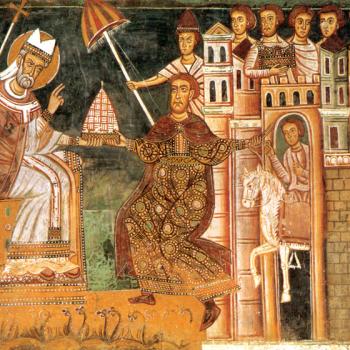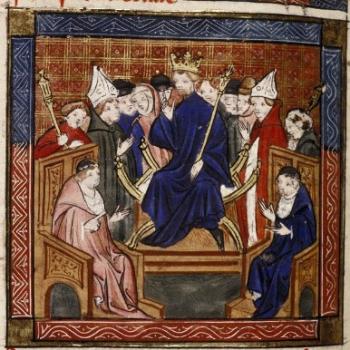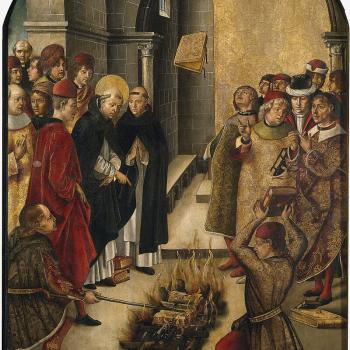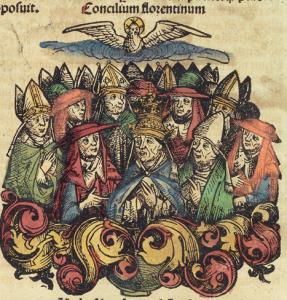
 (Wikimedia Commons)
(Wikimedia Commons)Originating in Bulgaria in the 10th century A.D., Bogomilism was a dualist heresy that spread from the Balkans to Western Europe, before finally fading away in the 14th century.[1] Its adherents believed that matter was evil, that the material world was created by the devil, which in turn lead them to deny that matter could act as a vehicle for Divine Grace in the Sacraments.[2] The heresy made its way into the Byzantine Empire by the 11th century, where Orthodox Christianity was the official religion.[3] In the Medieval Christian world, heresy could be and was punished by the state as a capital offense. While it is common knowledge that this occurred frequently in Western Europe, it is perhaps less known that it also happened in the Byzantine Empire[4], if less often. The focus of this article is on one such case.
Our source for the execution of a Bogomil leader named Basil, is Anna Comnena, the daughter of the Emperor Alexios I Komnenos (r. 1081-1118.)[5] While her Alexiad is a source to be used with some caution given her natural tendency to paint her father in the best possible light, it can nevertheless give us some insight into how capital punishment for heresy was looked upon in 11th century Byzantium. As she tells the story, her father had called for Basil, his disciples, and all of his followers to assemble at the imperial court to be judged. After finding fault, Alexios ordered them to be burnt. It seems that besides these, a number of people who were suspected of being Bogomils were brought before the Emperor too. Some disavowed the heresy, while others did not. The next day, in order to separate Christians from Bogomils, Alexios ordered two huge fires to be built, one having a cross in front of it and the other having none. He told the mixed group before him to choose which pyre they would die on, thereby forcing individuals to show their true colors. When the crowd had separated themselves, those in front of the fire with the cross were rescued at the last minute by the Emperor, while those who had identified themselves as Bogomils by their action were rounded up and thrown into prison, including Basil’s disciples who were jailed separately. The Emperor then sent Orthodox clergy to teach the prisoners and to plead with them to abandon their heresy. Some did and were released while others died in prison. With regards to Basil, we learn from Anna:
…all the members of the holy synod and the chief monks, as well as the patriarch of that time, Nicholas, decreed that Basil who was the heresiarch and quite unrepentant, deserved to be burnt. The Emperor was of the same opinion and after conversing with him several times and recognizing that the man was mischievous and would not abandon his heresy, he finally had an immense pyre built in the Hippodrome. A very large trench was dug and a quantity of wood, all tall trees piled up together, made the structure look like a mountain. When the pile was lighted, a great crowd slowly collected on the floor and steps of the circus in eager expectation of what was to happen. On the opposite side a cross was fixed and the impious man was given a choice, for if he dreaded the fire and changed his mind, and walked to the cross, then he should be delivered from burning. A number of heretics were there watching their leader Basil. He shewed himself contemptuous of all punishment and threats, and while he was still at a distance from the fire he began to laugh and talk marvels, saying that angels would snatch him from the middle of the fire, and he proceeded to chant these words of David’s, ‘It shall not come nigh thee; only with thine eyes shalt thou behold.’ But when the crowd stood aside and allowed him to have a free view of that terrifying sight, …then the bold fellow seemed to flinch from the fire and be disturbed. For as if wholly desperate, he constantly turned away his eyes and clapped his hands and beat his thigh. And yet in spite of being thus affected by the mere sight he was adamant. For the fire did not soften his iron will, nor did the messages sent by the Emperor subdue him. For either great madness had seized him under the present stress of misfortunes and he had lost his mind and had no power to decide about what was advantageous; or, as seems more likely, the devil that possessed his soul had steeped it in the deepest darkness. So there stood that abominable Basil, unmoved by any threat or fear, and gaped now at the fire and now at the bystanders. And all thought him quite mad for he did not rush to the pyre nor did he draw back, but stood fixed and immovable on the [418] spot he had first taken up. Now many tales were going round and his marvellous talk was bandied about on every tongue, so the executioners were afraid that the demons protecting Basil might perhaps, by God’s permission, work some wonderful new miracle, and the wretch be seen snatched unharmed from the middle of the mighty fire and transported to some very frequented place. In that case the second state would be worse than the first, so they decided to make an experiment. For, while he was talking marvels and boasting that he would be seen unharmed in the middle of the fire, they took his cloak and said, “Now let us see whether the fire will touch your garments,” and they threw it right into the middle of the pyre. But Basil was so uplifted by the demon that was deluding him that he said, “Look at my cloak floating up to the sky!” Then they ‘recognizing the web from the edge,’ took him and pushed him, clothes, shoes and all, into the middle of the pyre. And the flames, as if deeply enraged against him, ate the impious man up, without any odour arising or even a fresh appearance of smoke, only one thin smoky line could be seen in the midst of the flames. For even the elements are excited against the impious; whereas, to speak truthfully, they spare those beloved of God, just as once upon a time in Babylon the fire retreated from those young men who were dear to God, and enclosed them like a golden chamber. In this case the men who lifted up the accursed Basil had scarcely placed him on the pyre before the flames seemed to dart forward to snatch hold of him.” (Book XV, chapter X.)[6]
As one can see, this was not the capricious act of an Emperor standing alone. Rather, it was a calculated one that had the backing of the Orthodox clergy, the Patriarch of Constantinople, as well as the chief monks. As such, it is reflective of 11th century Byzantine society’s level of comfort with doling out capital punishment for the crime of heresy. Indeed, as Anna goes on, “the people looking on clamoured loudly and demanded that all the rest who belonged to Basil’s pernicious sect should be thrown into the fire as well…”[7] The Emperor, however, had the rest put into prison where they died in their heresy.
I hope you have enjoyed this post. Please consider subscribing to the e-mail list to be notified about recent posts.
[1] https://www.britannica.com/topic/Bogomils (accessed 2/20/19)
[2] Ibid.
[3] The schism between the Latin West and the Greek East dates from A.D. 1054.
[4] Cf. The Code of Justinian, Book I Title V.
[5] Alexios is most well-known as the Emperor who called on the West for military support against the Seljuk Turks who were invading Byzantine lands, the response to which is known as the First Crusade.
[6] https://sourcebooks.fordham.edu/basis/AnnaComnena-Alexiad00.asp?fbclid=IwAR0qfk_IMKqomeIRoCHpPPYY8L0cVX6tvlJzSCpRXx_s65fQJQfwSYgWQoI#BOOK XV (Accessed 2/25/2019.)
[7] Ibid.












